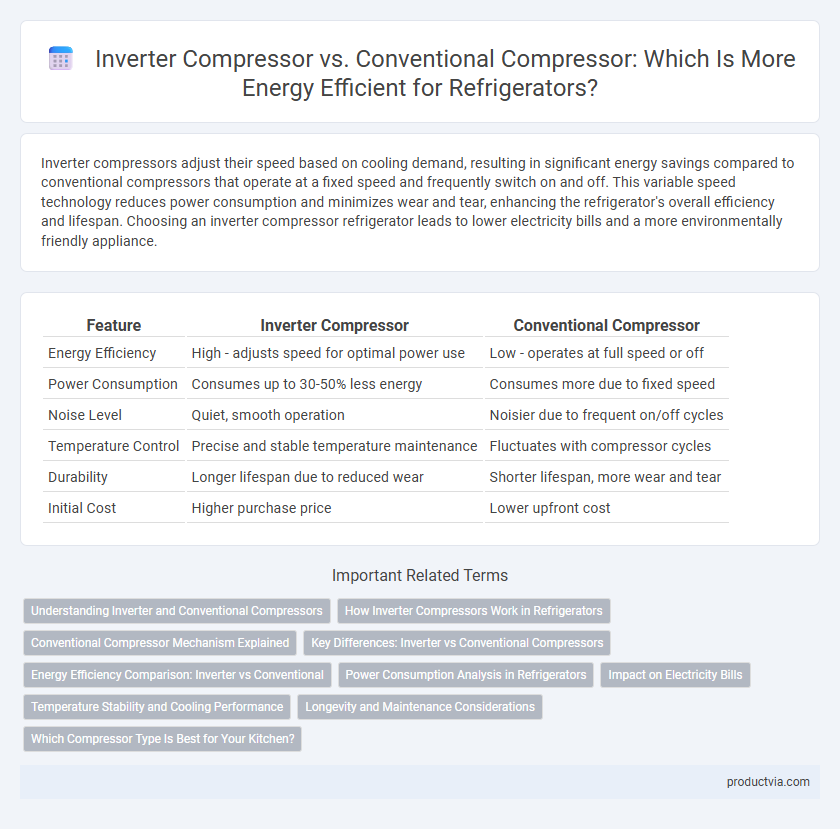Inverter compressors adjust their speed based on cooling demand, resulting in significant energy savings compared to conventional compressors that operate at a fixed speed and frequently switch on and off. This variable speed technology reduces power consumption and minimizes wear and tear, enhancing the refrigerator's overall efficiency and lifespan. Choosing an inverter compressor refrigerator leads to lower electricity bills and a more environmentally friendly appliance.
Table of Comparison
| Feature | Inverter Compressor | Conventional Compressor |
|---|---|---|
| Energy Efficiency | High - adjusts speed for optimal power use | Low - operates at full speed or off |
| Power Consumption | Consumes up to 30-50% less energy | Consumes more due to fixed speed |
| Noise Level | Quiet, smooth operation | Noisier due to frequent on/off cycles |
| Temperature Control | Precise and stable temperature maintenance | Fluctuates with compressor cycles |
| Durability | Longer lifespan due to reduced wear | Shorter lifespan, more wear and tear |
| Initial Cost | Higher purchase price | Lower upfront cost |
Understanding Inverter and Conventional Compressors
Inverter compressors in refrigerators adjust their speed dynamically based on cooling demand, significantly improving energy efficiency by reducing power consumption during steady-state operation. Conventional compressors operate at a fixed speed, cycling on and off frequently, which leads to higher energy usage and greater wear. Understanding this fundamental difference demonstrates why inverter compressors offer superior energy savings and longer appliance lifespan compared to conventional models.
How Inverter Compressors Work in Refrigerators
Inverter compressors in refrigerators adjust their speed to match cooling demands, reducing energy consumption by operating at variable speeds rather than a fixed on/off cycle like conventional compressors. This continuous modulation leads to more precise temperature control and less power wastage, significantly enhancing overall energy efficiency. As a result, refrigerators with inverter compressors consume up to 30-50% less electricity compared to those with conventional compressors.
Conventional Compressor Mechanism Explained
A conventional compressor in refrigerators operates on a fixed-speed mechanism that consistently cycles on and off to maintain the desired temperature, leading to higher energy consumption. This method causes frequent power surges and temperature fluctuations, reducing overall efficiency compared to inverter compressors. Understanding the conventional compressor's on/off cycling helps highlight why it uses more electricity and impacts the refrigerator's energy efficiency negatively.
Key Differences: Inverter vs Conventional Compressors
Inverter compressors adjust their speed based on cooling demand, resulting in significant energy savings compared to conventional compressors that operate at a fixed speed and frequently cycle on and off. This continuous modulation of power reduces electricity consumption by up to 30%, enhancing overall energy efficiency and prolonging compressor lifespan. In contrast, conventional compressors often experience higher wear and inconsistent temperature control, leading to increased energy wastage and maintenance costs.
Energy Efficiency Comparison: Inverter vs Conventional
Inverter compressors in refrigerators adjust their speed based on cooling demand, resulting in 30-50% energy savings compared to conventional compressors that operate at a fixed speed. This variable speed technology reduces power consumption by maintaining optimal temperature without frequent on-off cycles. Consequently, inverter compressor refrigerators deliver superior energy efficiency and lower electricity bills over conventional models.
Power Consumption Analysis in Refrigerators
Inverter compressors in refrigerators provide significantly lower power consumption compared to conventional compressors by continuously adjusting their speed to match cooling demand. This variable speed operation minimizes energy waste during periods of low cooling requirements, resulting in up to 30-50% energy savings. Conventional compressors run at a fixed speed, leading to frequent on-off cycles that increase power consumption and reduce overall efficiency.
Impact on Electricity Bills
Inverter compressors in refrigerators adjust their speed based on cooling demand, leading to significant energy savings by maintaining a consistent temperature without frequent power surges. Conventional compressors operate at a fixed speed, cycling on and off, which causes higher electricity consumption and increased utility bills. Studies show that refrigerators with inverter compressors can reduce electricity usage by up to 30%, directly lowering monthly energy costs.
Temperature Stability and Cooling Performance
Inverter compressors in refrigerators provide superior temperature stability by continuously adjusting their speed to maintain consistent cooling, unlike conventional compressors that cycle on and off, causing temperature fluctuations. This precise control enhances energy efficiency by reducing power consumption and preventing overcooling or warm spikes. Consequently, refrigerators with inverter compressors deliver optimized cooling performance and greater energy savings compared to those with traditional compressor systems.
Longevity and Maintenance Considerations
Inverter compressors in refrigerators adjust their speed based on cooling demand, resulting in lower energy consumption and reduced wear compared to conventional compressors that cycle on and off. The continuous, adjustable operation of inverter compressors enhances longevity by minimizing stress on components and reducing maintenance needs over time. Conventional compressors often require more frequent repairs and have shorter lifespans due to the frequent starting and stopping cycles that increase mechanical strain.
Which Compressor Type Is Best for Your Kitchen?
Inverter compressors adjust cooling speed to match demand, resulting in up to 30% greater energy efficiency compared to conventional compressors that run at full power until the desired temperature is reached. For kitchens with frequent door openings and variable usage patterns, inverter compressors maintain consistent temperatures and reduce electricity bills significantly. Conventional compressors may suffice for infrequent use but lack the energy-saving benefits ideal for modern, energy-conscious households.
Inverter compressor vs conventional compressor for energy efficiency Infographic

 productvia.com
productvia.com